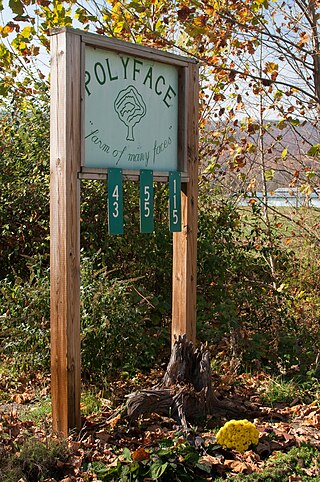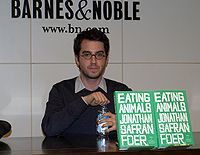
Veganism is the practice of abstaining from the use of animal products—particularly in diet—and an associated philosophy that rejects the commodity status of animals. A person who practices veganism is known as a vegan.

Vegetarianism is the practice of abstaining from the consumption of meat. It may also include abstaining from eating all by-products of animal slaughter. A person who practices vegetarianism is known as a vegetarian.

Polyface Farm is a farm located in rural Swoope, Virginia, run by Joel Salatin and his family. The farm is driven using unconventional methods with the goal of "emotionally, economically and environmentally enhancing agriculture". This farm is where Salatin developed and put into practice many of his most significant agricultural methods. These include direct marketing of meats and produce to consumers, pastured-poultry, grass-fed beef and the rotation method which makes his farm more like an ecological system than conventional farming. Polyface Farm operates a farm store on-site where consumers go to pick up their products.

Jonathan Safran Foer is an American novelist. He is known for his novels Everything Is Illuminated (2002), Extremely Loud & Incredibly Close (2005), Here I Am (2016), and for his non-fiction works Eating Animals (2009) and We Are the Weather: Saving the Planet Begins at Breakfast (2019). He teaches creative writing at New York University.

Viva! is a British animal rights group, which focuses on promoting veganism. It was founded by Juliet Gellatley in 1994. Viva! carries out undercover investigations to expose the abuse of factory farmed animals and produces information on how to go vegan, including recipes and shopping guides. It is a registered charity.

Michael Kevin Pollan is an American journalist who is a professor and the first Lewis K. Chan Arts Lecturer at Harvard University. Concurrently, he is the Knight Professor of Science and Environmental Journalism and the director of the Knight Program in Science and Environmental Journalism at the UC Berkeley Graduate School of Journalism where in 2020 he cofounded the UC Berkeley Center for the Science of Psychedelics, in which he leads the public-education program. Pollan is best known for his books that explore the socio-cultural impacts of food, such as The Botany of Desire and The Omnivore's Dilemma.

Bruce Gregory Friedrich is co-founder and president of The Good Food Institute (GFI), a Y Combinator funded non-profit that promotes plant- and cultivated meat alternatives to conventional animal meat. He is also a co-founder of the alternative protein venture capital firm New Crop Capital. Friedrich previously worked for PETA and Farm Sanctuary.

The practice of vegetarianism is strongly linked with a number of religious traditions worldwide. These include religions that originated in India, such as Hinduism, Jainism, Buddhism, and Sikhism. With close to 85% of India's billion-plus population practicing these religions, India remains the country with the highest number of vegetarians in the world.

Conversations regarding the ethics of eating meat are focused on whether or not it is moral to eat non-human animals. Ultimately, this is a debate that has been ongoing for millennia, and it remains one of the most prominent topics in food ethics. Individuals who promote meat consumption do so for a number of reasons, such as health, cultural traditions, religious beliefs, and scientific arguments that support the practice. Those who support meat consumption typically argue that making a meat-free diet mandatory would be wrong because it fails to consider the individual nutritional needs of humans at various stages of life, fails to account for biological differences between the sexes, ignores the reality of human evolution, ignores various cultural considerations, or because it would limit the adaptability of the human species.

Gene Baur, formerly known as Gene Bauston, is an American author and activist in the animal rights and food movement. He’s been called the "conscience of the food movement" by Time magazine, and opposes factory farming and advocates for what he believes would be a more just and respectful food system. Baur is president and co-founder of Farm Sanctuary, a farm animal protection organization. He is vegan and has been involved with animal rights since he co-founded Farm Sanctuary in 1986. Baur has authored two books and various articles.
Intensive animal farming, industrial livestock production, and macro-farms, also known as factory farming, is a type of intensive agriculture, specifically an approach to animal husbandry designed to maximize production while minimizing costs. To achieve this, agribusinesses keep livestock such as cattle, poultry, and fish at high stocking densities, at large scale, and using modern machinery, biotechnology, and global trade. The main products of this industry are meat, milk and eggs for human consumption.
Meat-free days or veggiedays are declared to discourage or prohibit the consumption of meat on certain days of the week. Mondays and Fridays are the most popular days. There are also movements encouraging people giving up meat on a weekly, monthly, or permanent basis.
Several individuals and groups have drawn direct comparisons between animal cruelty and the Holocaust. The analogies began soon after the end of World War II, when literary figures, many of them Holocaust survivors, Jewish or both, began to draw parallels between the treatment of animals by humans and the treatments of prisoners in Nazi death camps. The Letter Writer, a 1968 short story by Isaac Bashevis Singer, is a literary work often cited as the seminal use of the analogy. The comparison has been criticized by organizations that campaign against antisemitism, including the Anti-Defamation League (ADL) and the United States Holocaust Memorial Museum, particularly since 2006, when PETA began to make heavy use of the analogy as part of campaigns for improved animal welfare.
Animal-free agriculture, also known as plant agriculture, plant-based agriculture, veganic agriculture, stockfree farming, plant farming or veganic farming, consists of farming methods that do not use animals or animal products.
Jewish vegetarianism is a commitment to vegetarianism that is connected to Judaism, Jewish ethics or Jewish identity. Jewish vegetarians often cite Jewish principles regarding animal welfare, environmental ethics, moral character, and health as reasons for adopting a vegetarian or vegan diet.
Philip John Lymbery is the Global CEO of farm animal welfare charity, Compassion in World Farming International, Visiting Professor at the University of Winchester’s Centre for Animal Welfare, President of Eurogroup for Animals, Brussels, founding Board member of the World Federation for Animals and a Leadership Fellow at St George's House, Windsor Castle.
Farm Forward is a 501(c)(3) nonprofit whose mission is to promote conscientious eating, reduce farmed animal suffering, and advance sustainable agriculture. Farm Forward aims to eliminate the most harmful practices in intensive animal agriculture, increase the market share of humane and sustainable animal agriculture, and raise awareness about the cultural significance of animal agriculture.
Aaron S. Gross is an American historian of religions who focuses on modern Jewish ethics, the study of animals and religion, and food and religion. He serves as a professor of theology and religious studies at the University of San Diego. He has served as cochair of the American Academy of Religion's Animals and Religion group and as president of the Society of Jewish Ethics. Aaron Gross is a vegan.

The End of Animal Farming: How Scientists, Entrepreneurs, and Activists Are Building an Animal-Free Food System is a 2018 book by Jacy Reese that argues animal farming will end by the year 2100 based on effective altruism reasoning and social movement strategy.
Jim Mason is an American lawyer, journalist and animal rights activist.










